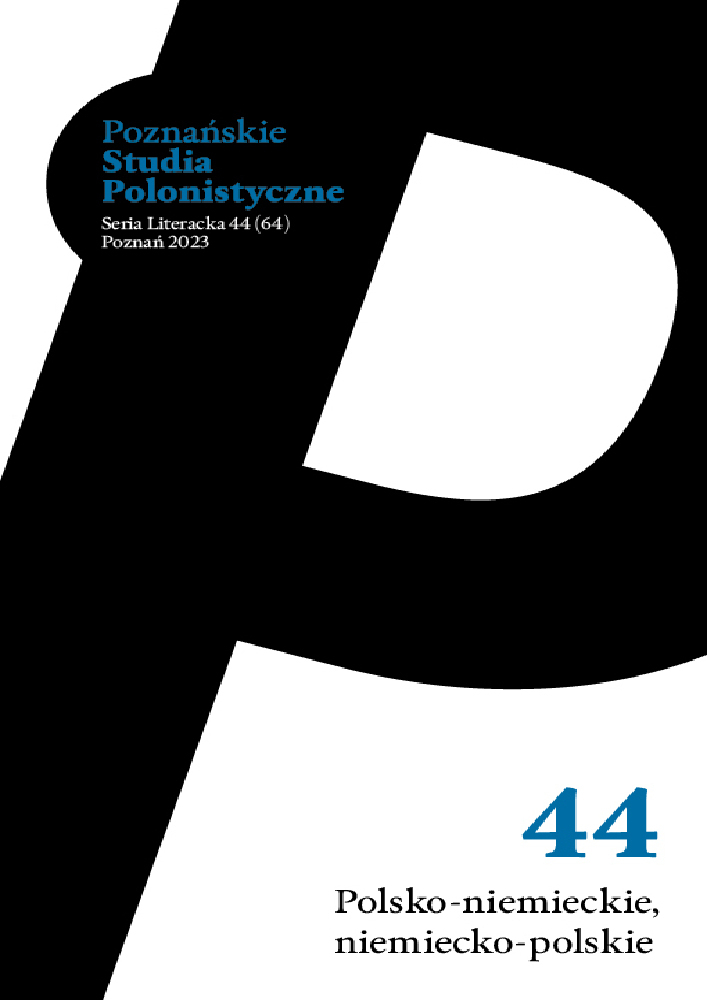Abstract
The subject of this paper is the image of Berlin and Germany that emerges from two film adaptations of the novel Berlin Alexanderplatz. The first one, a 1980 TV series by Rainer Werner Fassbinder, closely follows the letter and spirit of the original 1929 novel; we see a faithful recreation of the material world and the mindset of German society in the final years of the Weimar Republic. In the second one, a 2021 cinema production by Burhan Qurbani, the plot is modernised. The main context of the film is the plight of refugees and economic migrants in contemporary Germany and the problems portrayed are linked to issues of race and post-colonialism.
References
Bienert Michael (2017), Döblins Berlin. Literarische Schauplätze, Verlag für Berlin-Brandenburg, Berlin.
Craig Robert (2021), Alfred Döblin: Monsters, Cyborgs and Berliners 1900–1933, Legenda, Cambridge,
Döblin Alfred (1979), Berlin Alexanderplatz. Dzieje Franciszka Biberkopfa, przeł. Izabela Czermakowska, przedm. Stefan Lichański, Czytelnik, Warszawa.
Elsaesser Thomas (1996), Fassbinder’s Germany: History, Identity, Subject, Amsterdam University Press, Amsterdam,
„Film na Świecie” (1983), nr 1 (289): Rainer Werner Fassbinder.
Fiuk Ewa (2021a), Berlin Alexanderplatz, „Ekrany”, nr 2, s. 51.
Fiuk Ewa (2021b), Gwinejczyk na Alexanderplatz, czyli o możliwości zanieczyszczenia dominującej narracji, „Kwartalnik Filmowy”, nr 114, s. 31–49,
Keppler-Tasaki Stefan (2018), Alfred Döblin. Massen, Medien, Metropolen, Königshausen & Neumann, Würzburg.
Klotz Volker (1969), Die erzählte Stadt: ein Sujet als Herausforderung des Romans von Lesage bis Döblin, Carl Hanser Verlag, München. Lichański Stefan (1979), Przedmowa, w: Alfred Döblin, Berlin Alexanderplatz. Dzieje Franciszka Biberkopfa, przeł. Izabela Czermakowska, przedm. Stefan Lichański, Czytelnik, Warszawa, s. 7.
Mazierska Ewa (1999), Janusowe oblicze filmowego miasta, „Kwartalnik Filmowy”, nr 28, s. 38–53.
Richie Alexandra (2021), Berlin. Metropolia Fausta, t. 2, przeł. Maciej Antosiewicz, W.A.B., Warszawa.
Stanisławski Krzysztof (1998), Nowe kino niemieckie od 1962 roku do teraz wraz z Leksykonem reżyserów, Państwowa Galeria Sztuki, Sopot.
Syska Rafał (2003), Rainer Werner Fassbinder. Rewolucja, która nigdy nie nadeszła, w: Autorzy kina europejskiego, red. Grażyna Stachówna, Joanna Wojnicka, Rabid, Kraków, s. 59–78.
License
Copyright (c) 2023 Jacek Nowakowski

This work is licensed under a Creative Commons Attribution-NoDerivatives 4.0 International License.
Authors
Authors of texts accepted for publication in „Poznańskie Studia Polonistyczne. Seria Literacka” are required to complete, sign and return to the editor's office the Agreement for granting a royalty-free license to works with a commitment to grant a CC sub-license.
Under the agreement, the authors of texts published in „Poznańskie Studia Polonistyczne. Seria Literacka” grant the Adam Mickiewicz University in Poznań a non-exclusive, royalty-free license and authorize the use of Attribution-NoDerivatives 4.0 International (CC BY-ND 4.0)Creative Commons sub-license.
The authors retain the right to continue the free disposal of the work.
Users
Interested Internet users are entitled to use works published in „Poznańskie Studia Polonistyczne. Seria Literacka” since 2016, for non-commercial purposes only, under the following conditions:
- attribution - obligation to provide, together with the distributed work, information about the authorship, title, source (link to the original work, DOI) and the license itself.
- no derivatives - the work must be preserved in its original form, without the author's consent it is not possible to distribute the modified work, such as translations, publications, etc.
Copyrights are reserved for all texts published before 2016.
Miscellaneous
Adam Mickiewicz University in Poznań retains the right to magazines as a whole (layout, graphic form, title, cover design, logo etc.).

